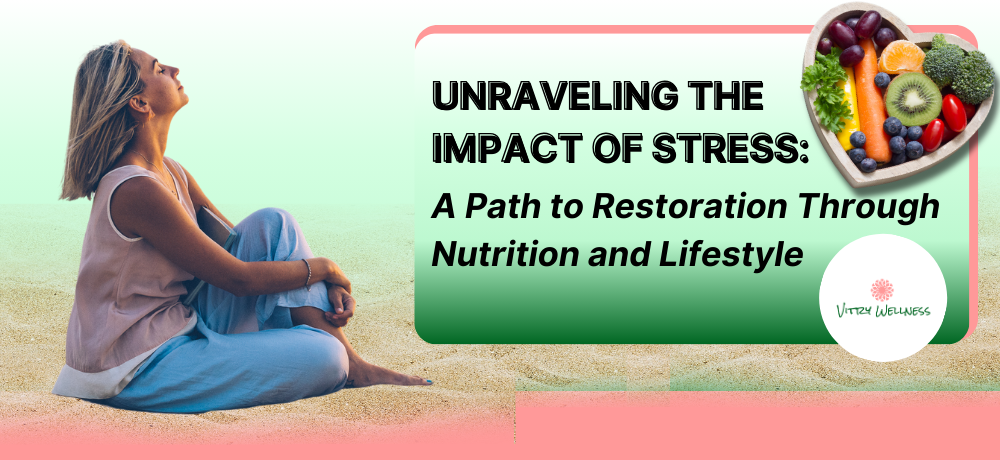
Unraveling the Impact of Stress: A Path to Restoration Through Nutrition and Lifestyle
- Vitry Wellness
Before now, I spent most of my adult life in various levels of severe stress. I did not know it at the time, but this stress was debilitating, harming my body and affecting every aspect of my life: performance, sleep, relationships, perspective, security (or rather fears and anxieties). It also contributed to a constant state of worry which weighed heavily on my mind and emotions. Sure, I knew that stress was a problem—we’ve all heard that it contributes to heart conditions or maybe cancer down the road. I was unaware, however, just how pervasive the “stress” was, how it permeated everything I touched, thought and dreamed. Stress was actually in charge.
What is stress really? Is it different for different people? Are some people just better at managing it or does it mostly affect us all roughly the same? Well, these are good questions and lucky for us, many nutritionists, physicians, acupuncturists, chiropractors, yoga instructors and other health scientists have pondered the same thing, some participating in studies and research to reveal statistically-sound answers. We now know that even a little unmanaged stress—especially repeat stressors—can dramatically alter your life trajectory. Who and what you hoped to be and have are often hijacked by your stressors— creating more and more space for the “demanding” career or the “impossible” thesis, the “necessary” marathon training, or the “almost complete” house remodel. Meanwhile, the other parts of yourself and your life are disappearing.
Turns out, stress modulation is possible through many means. Though I do not remember hearing about this in college, at work and definitely not growing up. Achieve, work harder, compromise more, complain less—these are concepts I incorporate from 8 to 28. Working with the stress in your life and modulating it with foods, natural supplements, herbs and lifestyle adjustments can reduce the impact it has on your body and life. At a minimum, maintaining this awareness, and the options to alter its course, will most assuredly present more opportunities to change your course.
Dr. Chatterjee says in his book, The Stress Solution, that bringing the stress response down can be as simple as a 20 minute walk a day or even staring at a tree from your desk chair! This is remarkable information. The long intense work out that supposedly loosened our stress load and helped us lose weight were not in fact doing either. These work outs can actually contribute to the stress cycle. Stress is managed by our Hypothalamic-Pituitary-Adrenal (“HPA”) axis. With continued HPA axis elevation, rarely are we able to perform at our best or have good judgment. Commonly, people chose alcohol to mediate these effects which is not an effective strategy. (Stephens, 2012).
We can bring our body back to homeostasis through restorative practices such as calming herbal teas, meditation or breathing exercises, soothing hot salt baths, stretching or relaxing yoga, walks both long and short, hugging a loved one or a pet, lounging through lunch under the trees or making a delicious meal for yourself or with others. All of these practices “restore” the body’s balance. The HPA (stress) axis is calmed while the adrenals and the hormone cortisol are relieved of their duties. The parasympathetic nervous system kicks in, allowing most of the organ functions to resume including the GI system and processing fuel. The body does not burn fat when we are stressed. We are in a ‘fight or flight’ mode—preparing to respond to something big, so it has no time to process food or burn fat. We need to have the heart pumping, more fuel should we need to run—so higher blood glucose levels, poor insulin regulation as we may need to use all that glucose for fuel, and so on. Detox systems are also not functioning optimally. We definitely will not have time for a bathroom break—so lots of halting and slowing down of normal metabolic systems.
Stress is not our friend. It derails us from our real life—one filled with joy, laughter, family and friends, good meals, good reads, gardening, dreaming, loving and being. Organic whole (unprocessed) foods and certain herbs such as adaptogens can help restore the body systems and rebuild the interconnected cellular communication system that keeps you healthy and happy. Vitry Wellness is prepared to partner with you on this stress-modulating journey with food and herbs. Taking a 20 minute walk today will start you on the track back to a life of YOUR choosing.
- Jen Vitry
References:
Chatterjee, R. (2019) The Stress Solution: The 4 Steps to Reset Your Body, Mind, Relationships and Purpose. Penguin Life, NY.
Ranabir, S., & Reetu, K. (2011). Stress and hormones. Indian journal of endocrinology and metabolism, 15(1), 18–22. https://doi.org/10.4103/2230-8210.77573
Segerstrom, S. C., & Miller, G. E. (2004). Psychological stress and the human immune system: a meta-analytic study of 30 years of inquiry. Psychological bulletin, 130(4), 601–630. https://doi.org/10.1037/0033-2909.130.4.601
Stephens, M. A., & Wand, G. (2012). Stress and the HPA axis: role of glucocorticoids in alcohol dependence. Alcohol research : current reviews, 34(4), 468–483.
Taneja V. (2018). Sex Hormones Determine Immune Response. Frontiers in immunology, 9, 1931. https://doi.org/10.3389/fimmu.2018.01931
